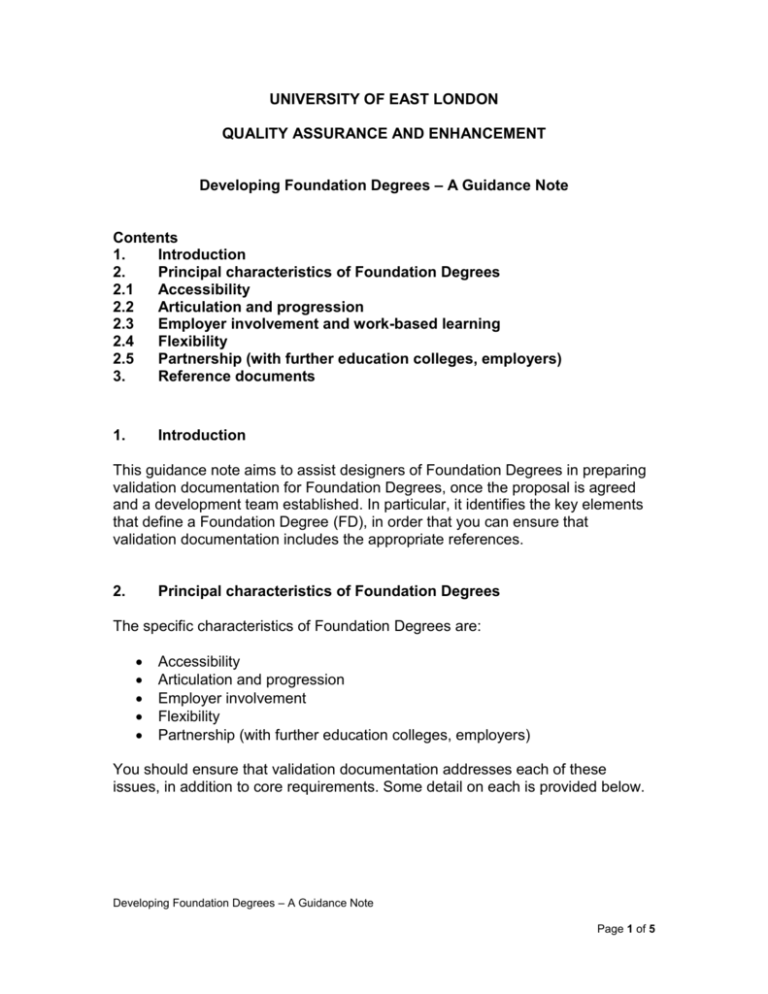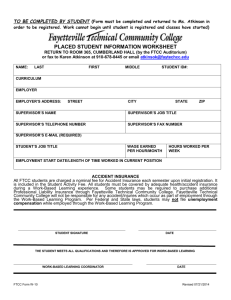developing foundation degrees * a guidance note
advertisement

UNIVERSITY OF EAST LONDON QUALITY ASSURANCE AND ENHANCEMENT Developing Foundation Degrees – A Guidance Note Contents 1. Introduction 2. Principal characteristics of Foundation Degrees 2.1 Accessibility 2.2 Articulation and progression 2.3 Employer involvement and work-based learning 2.4 Flexibility 2.5 Partnership (with further education colleges, employers) 3. Reference documents 1. Introduction This guidance note aims to assist designers of Foundation Degrees in preparing validation documentation for Foundation Degrees, once the proposal is agreed and a development team established. In particular, it identifies the key elements that define a Foundation Degree (FD), in order that you can ensure that validation documentation includes the appropriate references. 2. Principal characteristics of Foundation Degrees The specific characteristics of Foundation Degrees are: Accessibility Articulation and progression Employer involvement Flexibility Partnership (with further education colleges, employers) You should ensure that validation documentation addresses each of these issues, in addition to core requirements. Some detail on each is provided below. Developing Foundation Degrees – A Guidance Note Page 1 of 5 2.1 Accessibility Foundation Degrees are intended to increase access and widen participation into higher education. You should ensure arrangements for students to accredit prior learning and experience. Validation documents should take account of the intended recruitment focus for Foundation Degrees (i.e. students with no prior expectation of studying in HE) as well as the intended flexible nature of the programme, in planning student support arrangements. 2.2 Articulation and progression A Foundation Degree must be linked to at least one named Honours degree on to which a student may progress after successful completion of the Foundation Degree. You must identify the award or awards onto which students can progress in your validation document, clearly identifying the details of any additional modules required. Where a bridging programme is required between the Foundation Degree and the named Honours degree(s), the details must also be clearly specified. The additional study required on the Honours degree onto which a student may progress should not normally exceed 1.3 years for a full time equivalent student. 2.3 Employer involvement and work-based learning This is a key area that can provide some challenges. The integration of the workbased / professional learning element with academic studies needs to be planned carefully. Employer involvement is a key characteristic, and they must be involved in the design and review of programmes. You need to consider a number of related issues: The approval documentation for a Foundation Degree must make clear the way in which employers have been involved in the design of the degree and the provision made for their continuing involvement. Authentic and innovative work-based learning is an integral part of Foundation Degrees and their design. It enables learners to take on appropriate role(s) within the workplace, giving them the opportunity to learn and apply the skills and knowledge they have acquired as an integrated element of the programme. Learning in the work place can take many forms and serves a variety of purposes. When designing Foundation Degrees it is important that consideration is given to the ways in which the Developing Foundation Degrees – A Guidance Note Page 2 of 5 work-based learning is appropriate to the particular needs of the relevant employment sector or type of employer, and how the programme helps to provide the knowledge and transferable skills needed for employment. Equally important is the need to find strategies for responding appropriately to industry needs and subsequent changes. Reference should be made, where appropriate, to the relevant sector skills council guidelines for the accreditation of higher skills. The work-based element must be defined and assessed in relation to the learning outcomes identified. It therefore requires the identification and achievement of defined and related learning outcomes. Employers should, where possible, be involved in the assessment of work-based learning. This provides a set of challenges that need to be considered in relation to training for employers in, for example, assessment procedures; it may be necessary to provide support in the form of mentoring, and this should be identified. The use of simulation, ‘live’ projects or case-based scenarios in modules other than those in which work-based learning is assessed is also good practice as it gives a work-related context to the whole programme and all modules. This can help demonstrate that the work environment of the students runs through the entire programme. Methods of achieving work-based / professional learning Work-based / professional learning can be achieved through many forms, including: full-time or part-time work integrated work placements real work environments, simulations or ‘live projects Real work environment The term real work environment or ‘live project’ is accepted as something that may be on site in an institution. Examples might include a training restaurant, a travel agency, a crèche, a piece of specialist equipment which is being subcontracted out to an employer who offers one or more students the opportunity to work with him on his project (e.g. engineering kit which an employer cannot afford on his own but can hire the use of it from the college). For art and design, an institution might let units out to the student at a peppercorn rent. The students uses the unit as a base from which to contract her/himself to an employer. Developing Foundation Degrees – A Guidance Note Page 3 of 5 The distinguishing factors, as compared to a simulation, are that in all these situations the environments are real, the student experiences not only the subject related work but also the pressures, deadlines, standards and prioritising etc of external employment but they happen to be within the institution. 2.4 Flexibility Flexibility on the part of the institution, the learner and the employer is central to many aspects of Foundation Degrees. Flexibility applies to: flexible delivery modes and study patterns, including full time, part-time, distance, work-based, and web-based learning, with the flexibility to study, within reasonable limits, when and where it best suits the learner; flexible progression routes, including links with other professional awards and honours degree programmes; flexible admissions requirements. Models of flexible learning have been already designed in some UEL Schools and you may wish to take advantage of these. 2.5 Partnership (with further education colleges, employers) Partnerships are central to the concept of Foundation Degrees. These can be with employers, further education colleges and where relevant the Federation of Industry Sector Skills and Standards Council Body (formally the Sector Skills Council). The approval document should include for each programme the ways in which partners and employers have been involved in the design and delivery of the programme. Further education colleges can also play an important role in the recruitment to Foundation Degree programmes. Where there is a relevant Federation of Industry Sector Skills and Standards Council, involvement can be critical in securing financing for students and this should be investigated. 3. Reference sites and documents University of East London (UEL) Policy on Foundation Degrees in the Manual of General Regulations, Part 1, Description of our University’s Awards http://www.uel.ac.uk/qa/manual/foundation.htm UEL Manual of General Regulations Appendix 1 Awards offered by the University of East London Developing Foundation Degrees – A Guidance Note Page 4 of 5 http://www.uel.ac.uk/qa/manual/index.htm UEL Quality Manual, Part 11, Collaborations with other institutions http://www.uel.ac.uk/qa/qualityass_resp.htm Quality Assurance Agency for Higher Education (QAA), Foundation Degree Benchmark Statements http://www.qaa.ac.uk/en/Publications/Documents/Foundation-degreequalification-benchmark-2010.pdf Quality Assurance Agency for Higher Education (QAA), Foundation Degree Characteristics http://www.qaa.ac.uk/en/Publications/Documents/Foundation-DegreeCharacteristics.pdf Federation for Industry Sector Skills and Standards Council Body (formally Sector Skills Council) http://fisss.org/sector-skills-council-body/ National Occupational Standards (NOS) http://nos.ukces.org.uk/Pages/index.aspx Foundation Degree Forward (fdf) are now hosted by the Higher Education Academy (HEA) https://www.heacademy.ac.uk/search/site/foundation%2520degree%2520f orward JULY 2015 Developing Foundation Degrees – A Guidance Note Page 5 of 5




